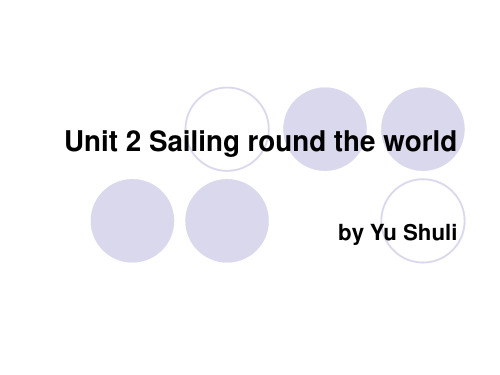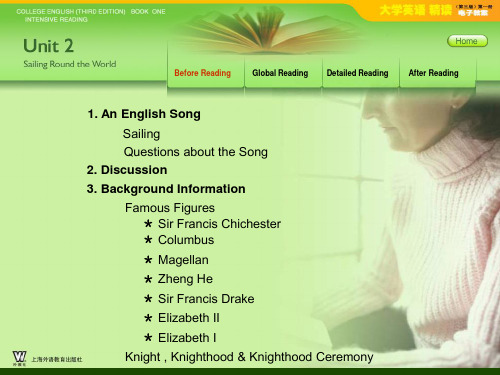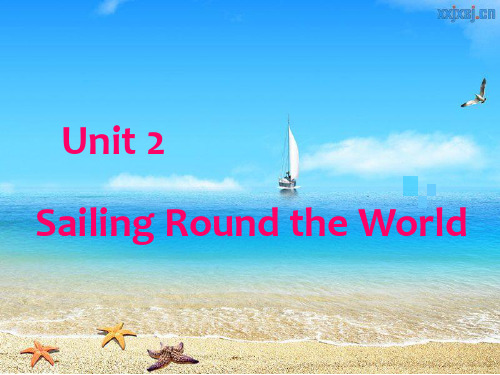大学英语精读unit2 sailing round the world
- 格式:ppt
- 大小:5.95 MB
- 文档页数:19




★英语听⼒频道为⼤家整理的⼤学英语精读第⼀册 Unit Two: Sailing Round the World。
更多阅读请查看本站频道。
TEXTAt sixty-five Francis Chichester set out to sail single-handed round the world. This is the story of that adventure.Sailing Round the WorldBefore he sailed round the world single-handed, Francis Chichester had already surprised his friends several times. He had tried to fly round the world but failed. That was in 1931.The years passed. He gave up flying and began sailing. He enjoyed it greatly. Chichester was already 58 years old when he won the first solo transatlantic sailing race. His old dream of going round the world came back, but this time he would sail. His friends and doctors did not think he could do it, as he had lung cancer. But Chichester was determined to carry out his plan. In August, 1963, at the age of nearly sixty-five, an age when many men retire, he began the greatest voyage of his life. Soon, he was away in this new 16-metre boat, Gipsy Moth.Chichester followed the route of the great nineteenth century clipper ships. But the clippers had had plenty of crew. Chicheater did it all by himself, even after the main steering device had been damaged by gales. Chichester covered 14, 100 miles before stopping in Sydney, Australia. This was more than twice the distance anyone had previously sailed alone.He arrived in Australia on 12 December, just 107 days out from England. He received a warm welcome from the Australians and from his family who had flown there to meet him. On shore, Chichester could not walk without help. Everybody said the same thing: he had done enough; he must not go any further. But he did not listen.After resting in Sydney for a few weeks, Chichester set off once more in spite of his friends' attempts to dissuade him. The second half of his voyage was by far the more dangerous part, during which he sailed round the treacherous Cape Horn.On 29 January he left Australia. The mext night, the blackest he had ever known, the sea became so rough that the boat almost turned over. Food, clothes, and broken glass were all mixed together. Fortunately, bed and went to sleep. When he woke up, the sea had become calm the nearest person he could contact by radio, unless there was a ship nearby, Wild be on an island 885 miles away.After succeeding in sailing round Cape Horn, Chichester sent the followiing radio message to London:" I feel as if I had wakened from a nightmare. Wild horses could not drag me down to Cape Horn and that sinister Southern Ocean again." Juat before 9 o'clock on Sunday evening 28 May, 1967, he aeeived back in England, where a quarter of a million people were waiting to welcome him. Queeh Elizabeth II knigthed him with the very sword that Queen Elizabeth I had sailed round the world for the first time. The whole voyage from England and back had covered 28, 500 miles. It had taken him nine months , of which the sailing time was 226 days. He had done what he wanted to accomplish.Like many other adventurers, Chichester had experienced fear and conquered it. In doing so, he had undoubtedly learnt something about himself. Moreover, in the modern age when human beings depend so much on machines, he had given men throughout the world new pride.NEW WORDSsingle-handeda & ad. (done) by one person alone 单独的(地)adventuren. 冒险(活动)soloa. single-handed 单独的transatlantica. crossing the Atlantic Ocean 横度⼤西洋lungn. part of the body with which one breathes 肺cancern. 癌determineda. with one's mind firmly made up 下定了决⼼的determinev.determinationn.retirevi. stop working at one's job(because of age) 退休voyagen. sea journey 航海;航⾏routen. way from one place to another 路线clippern. 快速帆船crewn. group of people who work together on a ship or aeroplane 全体船员;全体乘务员steervt. make (esp. a boat or road vehicle) go in a particular direction 为...撑舵devicen. a piece of equipment 设备;装置steering device n. 操舵装置damagevt. cause harm or injury to 损坏ad. harm, injury 损坏galen. very strong wind ⼤风covervt. travel (a certain distance) ⾏过(⼀段距离)previouslyad. before 以前previous a.attemptn. try 试图,尝试dissuadevt. prevent (sb.) from doing sth. by reasoning 劝阻treacherousa. more dangerous than it seems 暗藏危险的;*诈的capen. 海⾓rougha. (of weather or the sea) stormy; not calm (⽓候)有暴风⾬的;(海)波涛汹涌的fortunatelyad. luckily 幸运地;幸亏fortunatea.contactvt. get in touch with 联系,接触nearbyad. close by 在附近followinga. next; to be mentioned immediately 接着的;下列的wakenv. (cause to) wake 唤醒;醒来nightmaren. terrible dream 恶梦dragvt. pull along with great effort 拖,拉sinistera. 凶恶的,邪恶的knightn. 爵⼠vt. 封... 为爵⼠sword n. 剑,⼑accomplishvt. finish successfully 完成conquervt. overcome 征服undoubtedlyad. certainly ⽆疑地moreoverad. in addition 此外,⽽且humana. of or concerning people ⼈们beingn. a living thing, esp. a person ⽣物;⼈PHRASES & EXPRESSIOMSset outbegin a course if action 着⼿,开始give upatop doing 放弃be determined to (do)have a strong will to (do) 决⼼(做)(all) by oneself(completely) alone in spite ofnot taking notice of; not caring about 尽管;虽然by farby a large amount or degree...得多turn over(cause to) fall over, upset (使)翻倒,(使)倾覆can not helpcan not keep oneself from 禁不住PEOPER NAMESFrancis Chichester 弗朗西斯. 奇切斯特Gipsy Moth 吉普赛. 莫斯Sydney悉尼(澳⼤利亚城市)Cape Horn合恩⾓(智利)London伦敦Elizabeth伊丽莎⽩(⼥⼦名)Drake德雷克(姓⽒)。


外教社大学英语精读1、2册课后翻译答案第一册1:他这次考试失败使他意识到定期复习功课是多么重要。
He failed in the exam, which has made him realize the importance of reviewing his lessons regularly.2:请一定不要忘记离家前你父母对你说过的话。
Be sure not to forget what your parents said to you before you left home.3:我确信她的英语知识对这项工作来说是足够的。
I am sure her knowledge of English is adequate for the job.4:这篇文章的目的是告诉学生怎样培养良好的学习习惯。
The purpose of this article is to tell the students how to develop good study habits.5:在当今时代,人们越来越多地依赖计算机来解决各种各样的难题。
6:略读不仅帮助你对将要阅读的东西有所了解,还帮助你读的快些,提高你的阅读理解力。
7:有些人以为男孩子考试成绩总比女孩子好,然而,事实未必如此。
Some people think that boys…performanceon tests is always betterthangirls‟,that is not necessarily the case, however.8:即使智力一般的学生也可以通过改进学习习惯而成为优等生。
1:幸好附近有家医院,我们立即把他送到了那里。
Fortunately there was a hospital nearby and we took him there at once.2:胜利登上乔治岛后,船长向指挥部发了一份无线电报。
After succeeding in landing on George Island, the captain sent a radio message tothe headquarters by radio.3:他决心继续他的实验,不过这次他将用另一种方法来做。
u n i t2-S a i l i n g-r o u n d-t h e-w o r l dUnit Two Sailing Round the WorldI. The Teaching Aims:After learning the story which Francis Chichester traveled round the world alone in a small yacht in spite of the fact he had lung cancer, let the students understand & learn Francis Chichester’s indomitable death-defying spirit, which he marched forward courageously.II. The Important Teaching Points:1. Consolidate the use of the “Subjunctive Mood”.2.Understanding of “ He had giv en men throughout the world new pride.”III. Teaching Strategies:Class discussions, giving instructionsIV. Time: 3 periodsV. The Teaching Procedure:Step I. Learn the new words, phrases & expressions:1. fail:(1). (vi.) be unsuccessful; become weak or exhaustede.g: - She failed in everything she tried.- He has been failing in health in the past years.(2). (vt.) unable to do sth ; disappoint; do not pass an exame.g: - Jim failed to pass the final exam.- Words failed me.- The test is easy. You simply can’t fail it.2. voyage:(1) (n.) sea journeye.g:- The letter was written on Hemingway’s voyage from the US to Paris.- The first space shuttle voyage was devoted entirely to astronomy.(2) (v.) go on a sea journeye.g: - The seaman has almost voyaged around the world.Note: The wor d “journey (n.)” usually refers to going to a distant place on the land.“Travel (n.)” is a general word which means going to a distant place, by air, sea or car.“ Trip (n.)” usually refers to a pleasure excursion as in “a honeymoontrip”, “ a weekend trip to the seaside”.3. retire: (vi.)(1) give up one’s job because of old agee.g.- Professors usually retire at 60 in China.- Next year I will retire from the school.(2) go away; withdrawe.g.-After the dinner, the ladies retired to the drawing room, leaving the men to their cigars and drinks.(3) go to bede.g.-The writer usually retires at midnight.4. damage:(1) (vt.) cause harm toe.g. -Hurricane Andrew damaged thousands of homes.- The scandal damaged his career.(2) (n.) harm: losse.g. - We must find ways to repair the damage.e.g.- The hurricane did great damage to the crops.5. contact:(1) (vt.) get in touch withe.g - Do you contact your classmates often?e.g.- As soon as the headmaster arrives, he will contact you.(2) (n.) state of touching or communicatione.g. - Many people are afraid of contacts with AAIDS patients.e.g - Robinson Crusoe was out of contact with everybody else for a long time.6. waken:(1) (vi.) stop sleepinge.g - He wakened at the first ray of daylight.(2) (vt.) wake up sb.- e.g. - The alarm bell wakened him out of a sound sleep.Step II. Learn the textA. IntroductionIntroductory Remarks:Before we study the text, I’d like to a sk you some question :(1). What is your greatest dream ?(2). Have you ever dreamed of sailing round the world?(3). If you could sail to any place in the world, where would you want to go? Why?(4). If you decided to sail round the world, what would you need to take with you the boat?Almost everyone has dreamed of travelling round the world. However, sailing round the world all by oneself is very difficult and adventurous. Many people have traveled round the world, but no one else has done it the way Sir Francis Chichester did. Let’s see a living example that the text shows us.About Sir Francis Chichester (1901-1972):Born in Devon, Britain in 1901, Sir Francis Chichester was a British adventurer. In 1931, he planned to fly round the world, but the plane was damaged in Japan. In 1960, he won the first solo transatlantic race by sailing the “Gipsy Moth II”. During 1966-1967 he sailed round the world alone in a 53-foot yacht the “Gipsy Moth IV”. He published two books “The Lonely Sea and Sky” & “ The Gipsy Moth Circles the World”The text tells us briefly what happened on him on his voyage, one of the greatest seafaring exploits of all time. To begin with the text, let’s look at a map of Chichester’s course. (Show student s the map.)B. Divide the text.This article can be divided into three parts.Part I ( Lines 1-11)The Main Idea:Sir Francis Chichester was an ambitious man. He was determined to carry out his plan to sail round the world.Language Points(1)“Francis Chichester had already surprised his friends several times.”-Why?---He was not an ordinary individual & he had tried to do sth. special. E.g: He attempted to fly round the world. Although he had failed, the whole event showed that he was different from others. His courage, ambition & behavior surprised his friends.(2) Why was Chichester determined to carry out his plan?-a. His old dream of going round the world hadn’t been realized.-b. He won the first solo transatlantic sailing race.-c. He was not you ng 7 had lung cancer, which meant that he didn’t havemuch time or chance left.Part II (Lines 12-37)The Main Idea: The process of Francis Chichester’s travelling.a. From England to Sydney.b. From Sydney to EnglandLanguage Points:(1) clipper ship: used in the China tea trade in the nineteenth century. Thegreat age of the clipper was 1845-1860. Speed was demanded in the China tea trade & also for the fast delivery of cargoes to San Francisco and Melbourne during the California and Australian gold rushes. Clippers fell out of use as freight rates declined and steam ships provided competition.(2) crew: the captain, sailors, mechanics, cooks, etc.(3) steering device: a piece of equipment for particular direction(4) What was the difference between Chichester and the great nineteenth century sailors?The sailors of the nineteenth century used big clipper ships which had had lot of crew on them. Their success was the success of a group of people. Although Chichester followed their route, he had sailed alone. His success was the success of an individual.)(5) by far: usually used to modify a superlative or comparative degree adj. or adv.e.g : -She is by far better than Jim at spelling.-He is by far the best boy in the class(6) Why did everybody say that he had done enough when he arrived in Australia?The distance he covered was twice the previous record & he had already set a new record of sailing alone. Moreover, he was very tired and weak after 107 days of voyage.(7) “… the sea became so rough that the boat almost turned over.” so…that: to/ in such a degree that ( the adv. clause of result)e.g: -Was he so angry that he hit her?-She ran so fast that we couldn’t catch up with him.(8) dissuade sb from doing sth.:prevent sb. from doing sth. by giving reasonse.g:- They dissuaded her from leaving school.- The father finally dissuaded his son from giving up the job in the factory. (9) Cape Horn: a steep headland at the south of Horn Island, Chile. It is generally considered the southernmost point of South America. All the water between South America and the Antarctic Ocean is squeezed this narrow shallow gap. Sometimes the waves there may be as high as 50 feet.(10) “Wild horses could not drag me down to Cape horn and that sinister Southern Ocean again”:---“ Wild horses could not drag” is a common metaphor used mean that nothing, no matter how strong, could make you do something.e.g: Wild horses could not have dragged me away from the exciting film. (= Nothing could have made me leave.)Ask: - What was the picture when the sea became rough?-Why did he have such a horrible feeling about that night’s experience?Part III ( Lines 38- 49)1) The Main Idea: After Chichester arrived back in England, Queen Elizabeth and the people were waiting to welcome him. The author appraised his voyage.Ask: - What had Chichester learnt himself during the voyage?- What kind of new pride had he given to men through the world?Step III. Summary Questions & Concluding Remarks:Ask: - What do you think is Chichester’s greatest achievement?- Can you sketch a map to illustrate Chichester’s sailing course?The article des cribes Francis Chichester’s experience of sailing roun d the world, as well as his courage and determination in spite of many difficulties and attempts at dissuasion to prove human perseverance. People today can certainly learn a lot from him.C. Assignments:1. Recite the words.2.Read the text fluently.3. Preview all the exercises.References:The Lonely Sea and the Sky by Sir Francis Chichester, Summersdale Publishers; New Ed edition (January 31, 2002)"Gypsy Moth" Circles the World by Sir Francis Chichester, Hodder & Stoughton Ltd (June 1, 1972)。